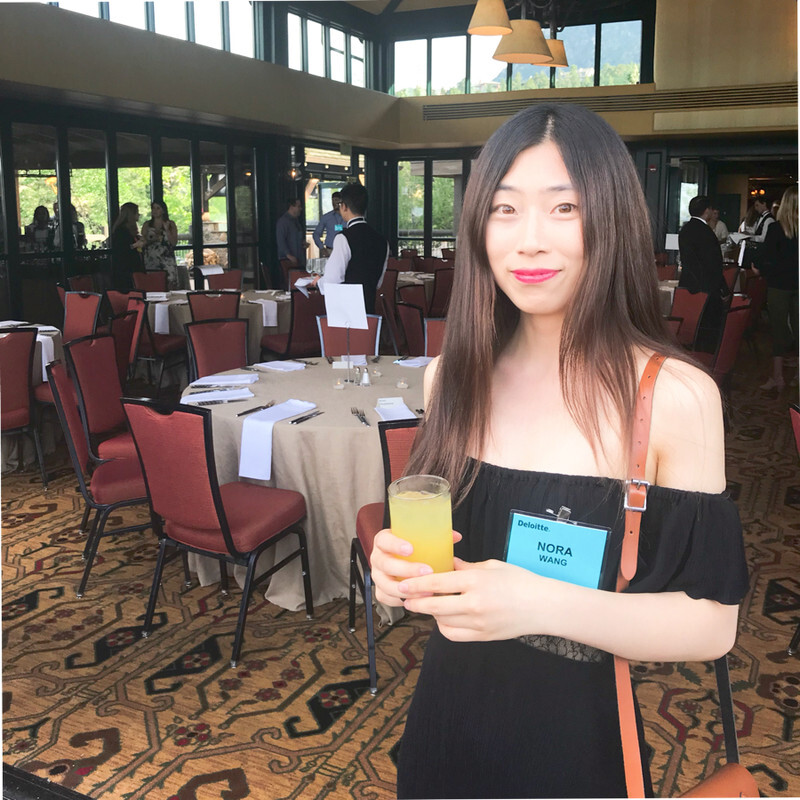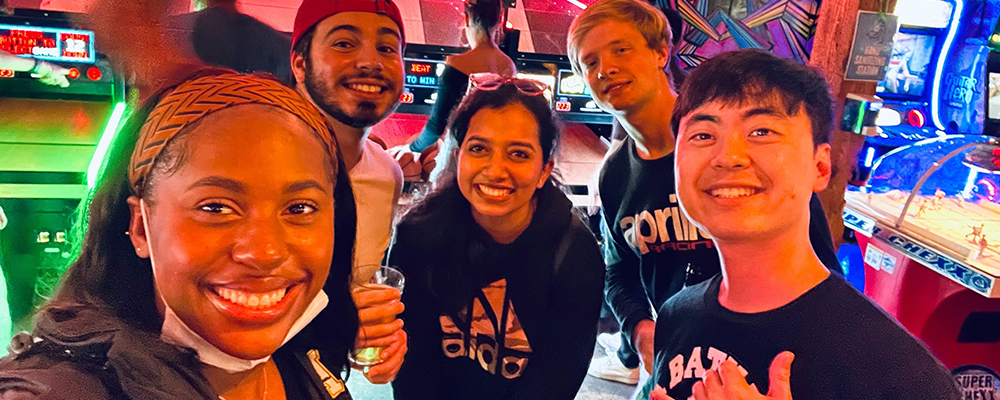“Positive reactions to VR from people like my parents who ordinarily would have no interest whatsoever in gaming or technology more generally are what makes me think that this industry has a bright future ahead of it. That’s why I am excited to work here.”

At the time of this interview, Yihang (Nora) Wang was a Data Scientist at the Facebook owned virtual reality (VR) company, Oculus. In this role, Yihang works on the product team to understand VR users and improve their experiences using Oculus headsets. Yihang also collaborates with engineers of the online Oculus Store to evaluate the impact of marketing campaigns.
Grant: What choices in your career led you to your current position as a Data Scientist at Oculus?
Yihang: I am originally from China, and only came to the U.S after I graduated with an economics and mathematics degree from a university in Hong Kong. Actually, I came to the United States to do a Masters program in Statistics at the University of Michigan. After graduating, I worked for a few years in the financial industry, but decided it wasn’t a great fit for me. Ultimately, I wanted the opportunity to do something less corporate and work in a more fun, product-oriented workplace. I worked at Disney first.
Grant: How did you end up going from Disney to Oculus? What sort of work responsibilities did you have at Disney, and how did that set you up for eventually working at Oculus?
Yihang: During my time at Disney I supported Disney Movie Studios as a Decision Science Consultant. On that team, I used lots of data from social media like Twitter, Facebook, etc. to forecast box office sales for upcoming movie releases. Our work allowed us to decide on a theater by theater level which movies we would show at each location. Factors like which stars were in the movie, what were the primary demographics around each theater, and what time of year the movies released in were all important considerations for our work.
I spent a year at Disney before I moved on to join Facebook as Decision Scientist, and I spent two years in that position prior to switching to a Data Scientist role at Oculus. For those who aren’t aware, Oculus is owned by Facebook, so it was an internal transfer.
The work that I did at Facebook as well as some of the work that I am now doing at Oculus is sort of a continuation of the type of work that I was doing at Disney. Now, though I have much more control over and access to the social media data that I was scraping before. Working on marketing campaigns at Facebook and conducting surveys for how users felt about our products meant I already had all the data I needed, or could get it whenever I wanted, which definitely makes my job easier.
Actually, many of the campaigns that I helped out on while I was in the Facebook position were about making users aware of some other Facebook product or feature. That’s something pretty unique to the Bay Area tech companies. We have ecosystems so large that we have to grab the user’s attention at times and say “Hey, did you know you can do this on Facebook too?” Of course, new products and services like Oculus’ headsets and software benefit heavily from campaigns like these.
Grant: Is that what first made you want to work at Oculus? Working on one of their marketing campaigns?
Yihang: I just saw a job opening for them in our system and I decided to opt for an internal transfer. Actually, I’ve always been a PC and console gamer, so it seemed like too interesting of an opportunity to pass up.
Grant: So your work at Oculus is very similar to the work you’ve been doing before then? Except now the Data Science-y marketing work you do involves VR headsets?
Yihang: My work did change a fair bit! First of all, this was my first opportunity to work as a Data Scientist in the product side of a firm rather than the marketing side, which in the Bay Area actually represents quite different responsibilities in your day to day work. I now work much more closely on refining the user experience of our headsets themselves.
Grant: I understand that you probably can’t talk about any of the projects that you have worked on in detail, but could you give us an outline of a project that you do? Anything related to computer vision, eye tracking, or facial recognition?
Yihang: All that and more, yes! The variety of projects we have here at Oculus is huge. Fundamentally, all of the problems that we want to solve center around making the experience of using our headsets better for our users. For example, how do we design our headset and controller software to best replicate the user’s movements? Getting this right is key to reducing motion sickness and giving the user the feeling of truly being present in their virtual environment
Of course, there are a number of other projects we work on which do improve the user experience in less obvious ways. Whether its increasing the performance of the software engine that runs the headset or things like optimizing battery life and heat output, we always are looking for ways to use our analysis skills to make the best products possible.
Oculus isn’t just a company that produces VR headset hardware, though. We also operate a gaming platform, the Oculus Store, which is very similar to Apple’s App Store or Valve’s Steam Store for PC gaming. This is where my marketing experience became useful again. For example, what if we want to discover what new features or products on our platform would appeal to the greatest number of users? We might use clustering techniques to segment our users into distinct groups so that we can understand what each of those groups want. Or, we might also scrape data from user reviews on Amazon to run sentiment analyses on our products.
Grant: That’s great, we’re learning about those topics in our program! Now seems as good a time as any to ask what sort of software that your team prefers?
Yihang: On our teams what software you use really depends on what sort of work you are doing. If it’s just exploratory data analysis, it really doesn’t matter what sort of software you use. However, we almost always use Python in cases where we want to implement a model or forecast into “production” where that model will actually impact the users.
Grant: Do you find the work you do on these projects, exploratory, production or otherwise, is made harder by the fact that you are working in such a young industry? There really hasn’t ever been anything like Oculus before, so there doesn’t seem to be much of a roadmap for the work that you all are doing.
Yihang: No there definitely isn’t, and that’s presented us with a lot of challenges. I think when I first joined Oculus there were a lot of new things for both the company and myself to learn, and those new things were truly new things that it was hard to have any background in. Like, if you wanted to work in the movie industry without having any experience working on a film set, at least you could rely on your own knowledge of movies as a movie watcher to provide some help. Almost nobody has that sort of background in VR. There is so much new work we are doing here that past experience just isn’t much of a factor. For example, imagine having to design a smartphone interface in three dimensions that even your grandma could use. Where would you start?
Plus, the company being a startup means the pace of work is much faster than at many other companies. It’s hard to get bored here. We also have a very open culture at Oculus, so I and other members of my team all work very closely with the research scientists and engineers who are designing the products and software from the ground up. We always know what’s going on across the company.
Grant: Did you know during school you wanted to work at a FAANG company (Facebook, Apple, Amazon, Netflix, Google) in advance, or was that something that happened serendipitously?
Yihang: I definitely had thoughts about working at Facebook while I was in my Masters program, but I had no idea about Oculus at the time.
Grant: Do you have any advice for people within our program who are interested in one day working for those companies?
Yihang: Well, I do think there is a view in the Bay Area that East Coast students are primarily interested in staying on the East Coast to work in finance. That’s a bias that you’ll have to make an extra effort to overcome if you want to work out here. Doing your own projects that are more relevant to the Bay Area tech companies would help towards that. Projects that deal with search engine rankings, marketing analytics, and really anything else that is highly technical and indicates your drive and curiosity would set you apart.
Oh, and read lots of textbooks! That being said, companies like Oculus tend to look for more experienced recruits, so I wouldn’t expect to be hired right out of a Master’s program unless you have lots of relevant prior experience, or already worked as a summer intern in one of the FAANG companies.
Grant: Our professors have been telling us the same thing!
Changing tracks a little before we wrap this up, though: Where do you see adoption of VR going in the next few years?
Yihang: Good question! I assume most of your friends and family haven’t even heard of VR, right? Or if they have, they probably haven’t tried it?
Grant: Nope, they haven’t. Most people I know are barely even aware of it!
Yihang: That’s what we see, too, and that’s the first challenge we have to get past. In fact, getting them to put the headset on for the first time is the hardest part! Our new headsets will make it easier and cheaper for people to get started with VR, and more rich software experiences in our store will hopefully make them want to keep them playing.
Grant: So you’ve found it difficult in your own experience to get people to try VR?
Yihang: At times it’s been hard to get them on board, but again, most people who I’ve seen try it have loved it. I actually brought a headset to China to show my mom and dad, and even they became fans of it! I had to buy one of the portable Oculus Go headsets for them once I left and took my headset home with me. Positive reactions to VR from people like my parents who ordinarily would have no interest whatsoever in gaming or technology more generally are what makes me think that this industry has a bright future ahead of it. That’s why I still wake up excited to work here.
Columnist: Grant Fleming
